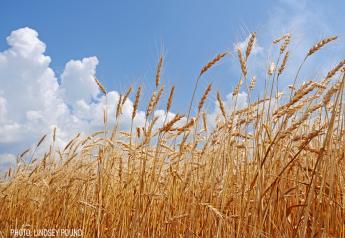The Blessings of Harvest Completed

By Terry Wanzek: Jamestown, North Dakota USA
Abraham Lincoln issued America’s first Thanksgiving proclamation in a time of violence. The year was 1863, and the president found it appropriate to give thanks even though America was torn by “a civil war of unequalled magnitude and severity.”
War was on my mind earlier this month, as I harvested corn on our family farm in North Dakota. It occurred to me that I’m fortunate to farm in peace.
We take so many things for granted—but as Thanksgiving approaches, we should count our blessings and express our thanks.
Let’s start with this simple fact of peace. I could offer that farmers wage war every day, as we battle the elements. A few years ago, a wet fall turned our fields to mud and made it nearly impossible to run our combines. We had to let a lot of corn stand through the winter and complete our job the following February and March. It felt like a war of attrition.
Yet we’ve never had to grow food in an actual war zone. That’s the reality of Kees Huizinga, a Ukrainian farmer who has labored through a brutal year of conflict. In a series of dispatches for the Global Farmer Network, Kees has written about his difficulties. For his valiant efforts to farm in these awful conditions as well as to educate the rest of us about his challenges, he recently was recognized with the GFN’s Kleckner Global Farm Leader Award.
His experience teaches us that there’s nothing inevitable about peace.
We also should be grateful for the weather. Farmers may be famous for complaining about it, and weather can and does pose serious challenges to our work. But whatever we endure, others have suffered much worse.
My family planned a vacation to spend Thanksgiving this year in Florida, at a beach house we had rented near Fort Myers. It’s a great way to gather with our kids and grandkids.
Then came Hurricane Ian, the deadliest tempest to hit Florida in nearly a century. It struck at the end of September, killing about 150 people in the United States and causing an estimated $50 billion in damages. Southwest Florida will need years to recover.
I’m grateful that my family was not in the hurricane’s path of destruction—and I’m praying for the people who couldn’t avoid it.
Most years, the weather here in North Dakota causes trouble, from blizzards in the spring to windstorms, thunderstorms and hail in the summer. In 2022, our problem was a mild drought. Since June, I don’t think we’ve had a single rain event of more than a quarter of an inch.
That’s why I’m thankful for biotechnology. A generation ago, this lack of rainfall would have depressed our yields. Modern genetics, however, have allowed our crops to make excellent use of what moisture they receive. Combined with the way today’s crop-protection tools help us defend against weeds, our corn and soybeans have flourished when earlier and more primitive varieties might have withered. And now we’re enjoying a satisfactory yield—not the best I’ve ever seen, but good enough.
I’m awestruck by other advances in technology, too. If my grandfather could see what we have, he’d think we’re living in a world of wonders. Our tractors can steer themselves, which reduces fatigue. Our grain carts can synchronize with our combines, which makes us more efficient and less wasteful. Our software allows us to map our fields down to the square foot, helping us plant seeds and apply fertilizer with amazing precision.
I should add that I’m also grateful for international trade. Global markets allow me to gain access to essential crop inputs and also access to export markets to sell much of what I grow to customers whom I’ll probably never meet.
When President Lincoln wrote his original Thanksgiving proclamation, he began by observing that the year “has been filled with the blessings of fruitful fields and healthful skies.”
That’s all a farmer really needs, and it describes our latest growing season. We finished our harvest a few weeks ago—a little early for us, in another blessing.
The days were many and hours were long, but often ended with amazing sunsets, reminding us, as Lincoln put it in his proclamation, of “our beneficent Father who dwelleth in the Heavens.”
Terry Wanzek grows wheat, corn, soybean and pinto beans on a family farm in North Dakota. He serves as a ND State Senator and volunteers as a board member for the Global Farmer Network. This column originates at www.globalfarmernetwork.org







